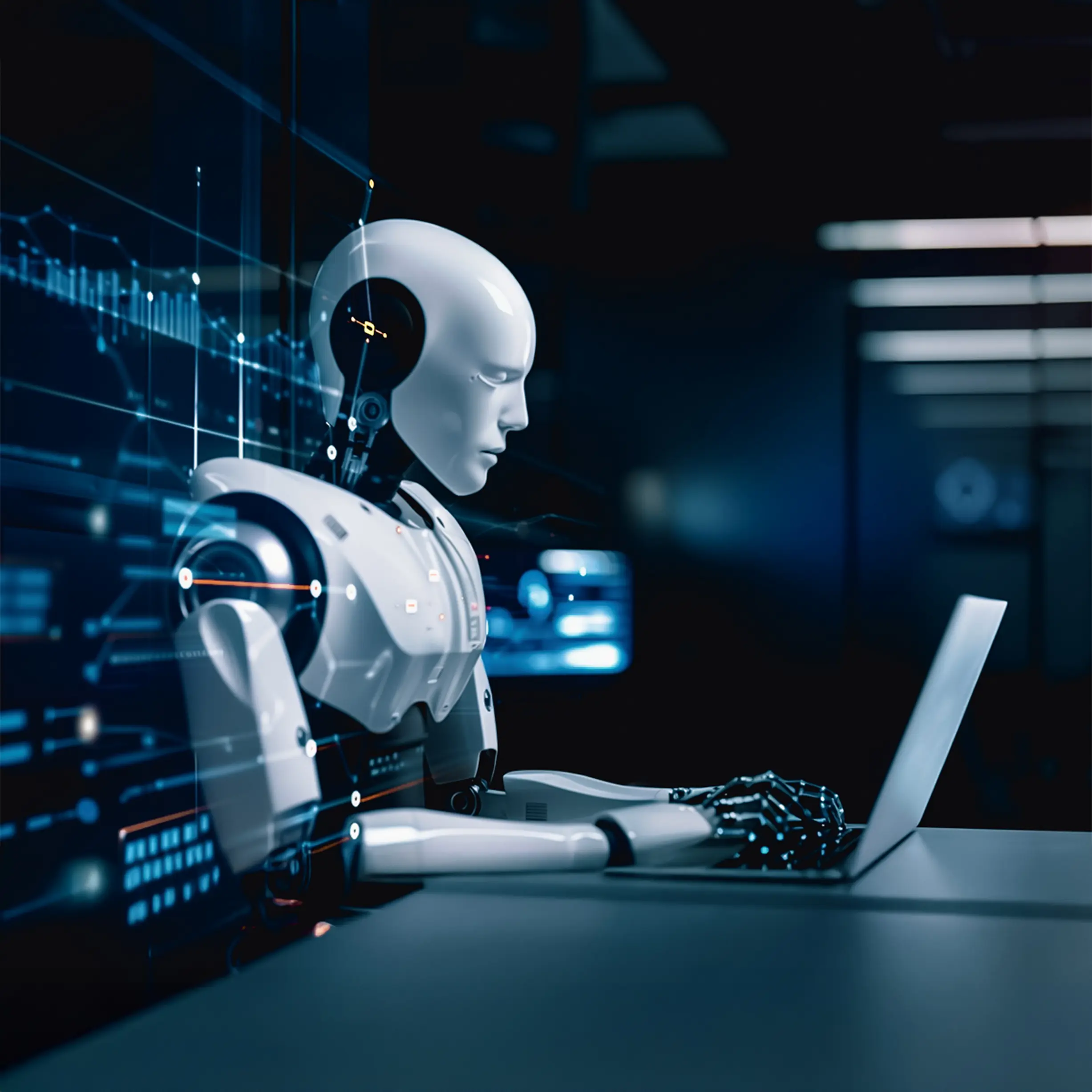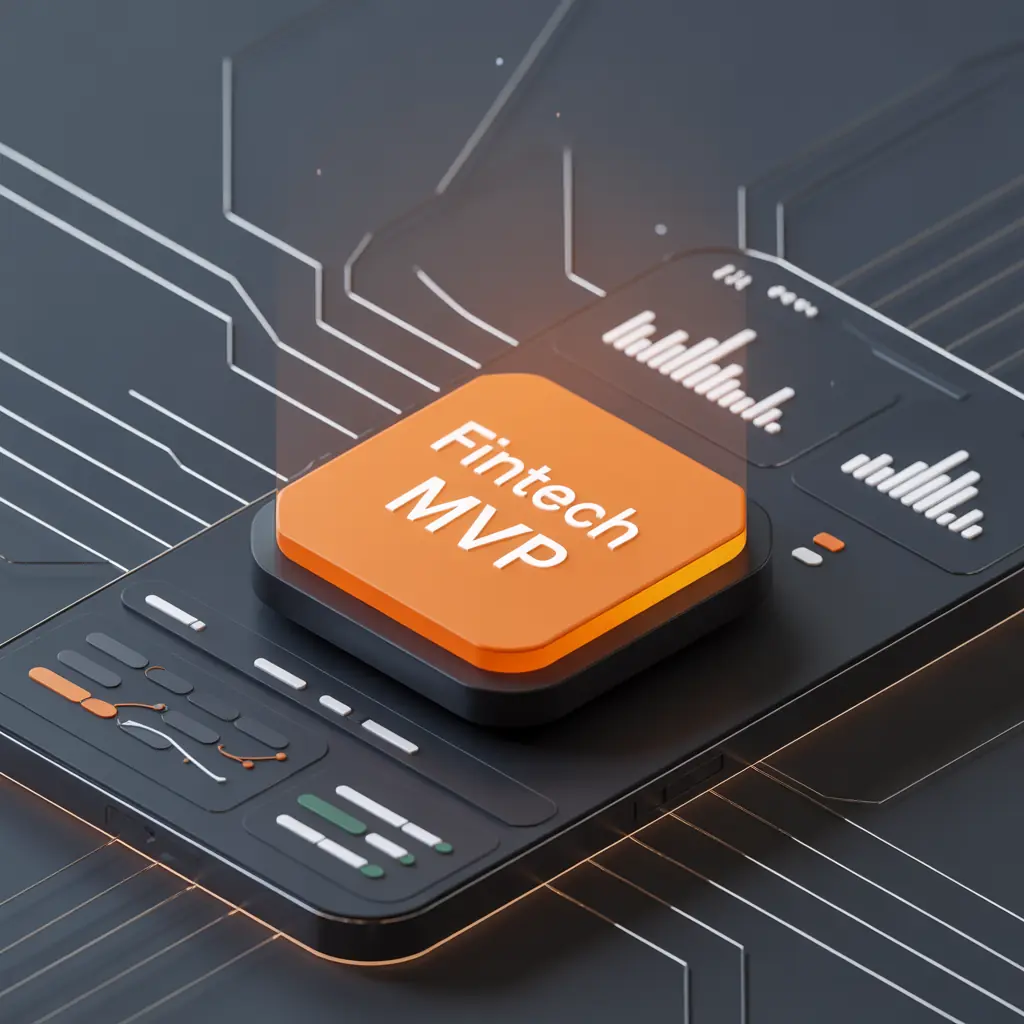How Is AI Changing the Tech Landscape Globally?
Business
23/04/25
Read time: 16 min
More than 50% of large companies have already adopted AI into their operations, while 42% of businesses that still haven’t are considering introducing artificial intelligence into their processes according to BusinessDasher.
The statistics are mind-blowing — fairly new technologies are now dominating the global market. To help you navigate the AI topic and decide whether it’s worth your attention, we analyzed how AI is changing the global tech landscape and outlined the key insights in this article.
AI Innovations Across Industries
AI-driven solutions keep unlocking new business opportunities from different industries, including healthcare, automotive, finance, and retail. Let’s take a closer look at the benefits AI can bring to each of these industries below.
AI in Healthcare

AI is changing the healthcare industry by automating disease diagnostics and patient treatment. Utilizing data analysis and machine learning, the potential possibilities of AI in the medical industry are limitless. Let’s check a more detailed review of the benefits AI can bring to healthcare:
Revolutionizing diagnostics through AI
Health diagnostics has transformed once and for all since the discovery of AI. How is this possible? The thing is, AI is capable of analyzing vast datasets rapidly, enabling early disease detection that is impossible to reach with manual examination.
AI is a healthcare game-changer, as it helps with the early detection of such life-threatening diseases as cancer, diabetes, and versatile heart conditions. By analyzing input data and detecting specific patterns, AI not only improves the diagnostic process but also reduces human error and provides patients with better recovery prospects due to early disease detection.
AI-driven personalized treatment plans
Unlike human-generated treatment plans, AI-driven treatment enables a highly customized approach. Let’s now dispel a common misconception that devising a therapy plan is no big deal once the disease has been successfully diagnosed. In reality, a therapy plan is far from black and white and will differ substantially for different patients.
That’s why AI comes in handy, as it can generate a personalized treatment plan by analyzing patient history and health data, including genetics, lifestyle, allergies, medical history, etc. This way, the patient will receive the most optimal treatment with minimized side effects.
AI in Automotive

AI fuels the automotive industry by contributing to the development of autonomous vehicles and enhancing the safety features of cars, making transportation more efficient and secure.
The rise of autonomous vehicles
AI drives the development of autonomous vehicles, enabling independent machine navigation and decision-making. But how exactly does artificial intelligence contribute to this?
The thing is, AI systems are capable of analyzing the data from ML algorithms and sensors right away to identify the current environment and make on-the-spot decisions without human intervention.
An autonomous vehicle is a promising technology that paves the future of mobility and transportation free from human error and hectic traffic. That’s why the role of AI in its development can’t be overestimated.
AI’s role in enhancing vehicle safety
No less significant role of AI in the automotive industry is empowering vehicle safety. AI comes of great help in enhancing advanced driver-assistance systems (ADAS) and preventing road traffic accidents. Now, driver and passenger safety hit a new quality bar, as AI has enabled such features as collision avoidance, automatic braking, lane-keeping assistance, and adaptive cruise control.
By processing real-time data from cameras, radars, and sensors, AI predicts and responds to potential hazards faster than humans, making vehicles safer and reducing the likelihood of accidents.
AI in Finance

AI is transforming the finance sector by enhancing fraud detection, optimizing risk assessment, and delivering personalized advisory services. Let’s dive into more details about the applications of AI in the finance industry.
AI in fraud detection and risk assessment
AI is an exceptional tool for the detection of fraud activities in the financial industry. By analyzing massive datasets, AI identifies anomalies and fraudulent patterns to assist financial experts in their daily operations. One of the key benefits of utilizing AI in the financial industry is that machine learning models continuously evolve, adapting to new threats. This simplifies the detection of complex financial schemes in real time.
Besides, AI can evaluate financial transactions, credit histories, and market trends to deliver precise risk scores. This way, financial establishments can make better-informed decisions and mitigate potential losses.
How AI is transforming financial advisory services
Another use case of AI in the financial industry is improvement of the financial advisory services. How does it work? Using algorithms analyzing market trends, investment goals, and individual risk tolerance, AI can provide data-driven insights to clients.
AI financial assistants will eventually reshape the industry, making financial advisory more accessible. Apart from that, AI can be used to automate routine tasks of financial experts as well as provide predictions, allowing for more strategic and focused client interactions.
AI in Retail

AI transforms the retail industry by providing personalized shopping experiences and optimizing inventory and supply chain operations for greater efficiency and customer satisfaction. Sounds interesting? Let’s find more insights on AI in the retail industry.
Personalized shopping experiences through AI
AI has come of great use enabling highly personalized shopping experiences. Analyzing such indexes as customer preferences, browsing behavior, and purchasing history has become easier than ever with the capabilities of AI.
AI-powered systems can provide products tailored to the individual needs of customers, making the retail industry more efficient. Besides, AI-driven chatbots and virtual assistants further enhance customer experience, creating a seamless and customized shopping journey.
Inventory and supply chain optimization using AI
Predicting demand, optimizing stock levels, and minimizing waste are some of the other benefits AI can bring to inventory management.
Machine learning algorithms analyze historical data, market trends, and external factors to ensure timely restocking and efficient logistics. This enhances operational efficiency, reduces costs, and ensures that customers always find what they need when they shop.
After analyzing the impact of AI on versatile industries, it becomes clear that artificial intelligence is a cornerstone of modern business strategy. As AI continues to evolve, its impact will expand even further. If you’re still hesitating whether to introduce AI into your operations, drop us a line and our experts will get back to you shortly with a consultation on your specific request.
AI and Software Development

Let’s now review the specific applications of artificial intelligence in the software development processes. Check out the points below to get a comprehensive understanding of AI-driven software engineering.
The Integration of AI in Software Engineering
Are you looking to enhance the software engineering process? Check AI applications that will help you streamline your software development processes.
AI-assisted code generation and bug fixes
Writing code and fixing bugs has become much easier since the launch of LLMs. Machine learning-powered tools help engineers by providing common code structures and checking the code for bugs in real time. Overall, AI reduces software development time and minimizes code errors.
Predictive analytics in software project management
If you have some historical data, predictive analytics may come of great use for your project, as it can help you make data-driven predictions based on past experiences. You can forecast project timelines, resource needs, and potential risks.
How does it work? As simple as this — AI-powered tools analyze patterns in past projects to identify inefficiencies and points for improvement in the current one. This approach helps reduce delays, optimize resource allocation, and enhance overall project success rates.
All-in-all, your business will benefit from the integration of AI tools, whether you’re looking to automate the development or want to enhance the software project management process.
AI in Cybersecurity

AI is changing cybersecurity by improving threat detection, automating incident response, and strengthening prevention strategies against evolving cyber threats. Find more insights about AI in cybersecurity below.
Enhancing threat detection with AI
Data threat detection is another sector that benefits from the use of AI. Spotting potential cyberattacks is much easier now, as machine learning algorithms enable the analysis of vast amounts of data instantly. This way, patterns of anomalies can be defined quickly to prevent data losses and security violations in time.
Unlike traditional methods, AI enables unparalleled system security, as it keeps adjusting to emerging threats on the go. Thus, detecting sophisticated malware, phishing attempts, and network intrusions is easier than ever with AI.
AI’s role in incident response and prevention strategies
AI helps companies detect breaches faster and respond to them before they have caused harm. Using AI tools, you can not only detect security breaches early on but also block those activities and suggest ways to fix system vulnerabilities.
Security teams can benefit from integrating AI into their daily operations, as this will simplify potential threat prediction and this way, reduce their workload. While AI will handle the routine tasks, security experts will get the opportunity to manage tasks requiring human interaction.
AI and Big Data

AI’s contribution to Big Data management is remarkable — it improves decision-making, enhances data visualization, refines data quality through automation, and enables real-time data processing for instant adjustments.
AI in Data Analytics
Predictive Analytics and decision-making
Not so long ago, the accuracy of business and data predictions was more or less on the “reading-coffee-grounds” level. With the appearance of AI, data analytics has changed drastically. Now, machine learning algorithms analyze historical and real-time data to identify trends, forecast outcomes, and uncover hidden patterns with impressive accuracy.
Predictive analytics empowers businesses to make better-informed decisions and optimize their strategies correspondingly.
Enhancing data visualization with AI
Another AI’s superpower is the ability to transform raw data into interactive visual formats. You can utilize automated tools that will highlight key insights, suggest the best visualization techniques, and even adapt displays based on user preferences. This helps stakeholders easily understand complex datasets, facilitating faster and more accurate decision-making.
AI’s Role in Big Data Management
Data quality management with AI
AI improves big data management with the assistance of machine learning algorithms. To improve data quality, AI identifies and corrects errors, deletes duplicate items, and fills in missing information. It also ensures the data accuracy and consistency.
Besides, AI tools are capable of categorizing and classifying data.
Real-time data processing and insights
Analyzing vast amounts of data in real time has become possible with the invention of specialized AI tools. AI-powered systems can detect trends, anomalies, and actionable insights instantly, enabling businesses to adjust their strategies on the go.
This capability is especially critical for industries that rely on up-to-the-minute information, such as finance, healthcare, and logistics.
AI and the Internet of Things (IoT)

The core use case of AI in the Internet of Things devices is to optimize equipment performance and enable high-quality predictive maintenance. This way, connected systems become smarter, more efficient, and proactive.
AI optimizing IoT device performance
Optimizing IoT device performance has become easier with machine learning algorithms. By analyzing real-time data from IoT devices, ML algorithms can offer data-driven adjustments to improve the efficiency of the device.
AI-driven systems also enhance device communication, ensuring faster and more reliable data exchange between connected devices. This means our homes will become smarter, industrial operations will be streamlined, and users will continue getting better digital experiences in the coming years.
Predictive maintenance through AI and IoT integration
AI-powered IoT devices pave the way for next-level maintenance strategies. Analyzing sensor data, AI can predict potential equipment failures before they occur. This way, businesses get the opportunity to perform their maintenance activities proactively, reducing downtime and repair costs.
Predictive maintenance will especially come in handy for such sectors as manufacturing and transportation, as these domains are particularly vulnerable to unplanned disruptions.
AI and Blockchain

Last but not least is the use of AI in the blockchain sector. AI enhances blockchain by improving security through advanced threat detection and automation of transactions with AI-powered tools.
Improving blockchain security with AI
AI is enhancing blockchain security by identifying vulnerabilities and preventing potential breaches. Machine learning algorithms analyze blockchain activity to detect unusual patterns, such as fraudulent transactions or hacking attempts.
By providing real-time monitoring and threat detection, AI strengthens the inherent security of blockchain systems, making them more robust against cyberattacks.
AI-driven automation in blockchain transactions
AI streamlines blockchain processes through automation, improving efficiency and scalability. Smart contracts powered by AI can execute transactions automatically based on predefined conditions, reducing human intervention and minimizing errors.
This integration accelerates transaction processing and enhances the reliability of decentralized systems in industries such as finance, supply chain, and healthcare.
Final thoughts
After analyzing several industries and domains, we can tell without exaggeration — AI is fundamentally transforming the global tech landscape. Artificial intelligence drives innovation across industries and reshapes how we approach challenges and opportunities.
AI empowers organizations with tools for greater efficiency, accuracy, and scalability. If you’re still hesitating about integrating AI into your business or contemplating building an AI software product, don’t hesitate to drop us a line and get a consultation from our AI development experts.
FAQ
How can AI boost your business?
Your business can benefit from AI in multiple ways — you can automate repetitive operations, gain insights through data analysis, and personalize your customers’ experiences. To get the most out of AI for your business, partner with a reliable tech vendor, like Engipulse, and build a custom AI solution based on your specific needs and requirements.
How long will it take to integrate AI into your product?
AI system development and integration time will completely depend on the specifics of your product, the AI functionality you require, and your existing system features. The process can range from a few weeks for basic AI integrations to several months for more advanced custom AI solutions.
What should you consider before introducing AI into your system?
First, evaluate your existing system and the technology stack it uses. Next, define clear objectives you want to reach with AI. To ensure AI brings your business the expected results, partner with a software engineering vendor that will select the right AI tools, integrate them, and scale the system seamlessly.




